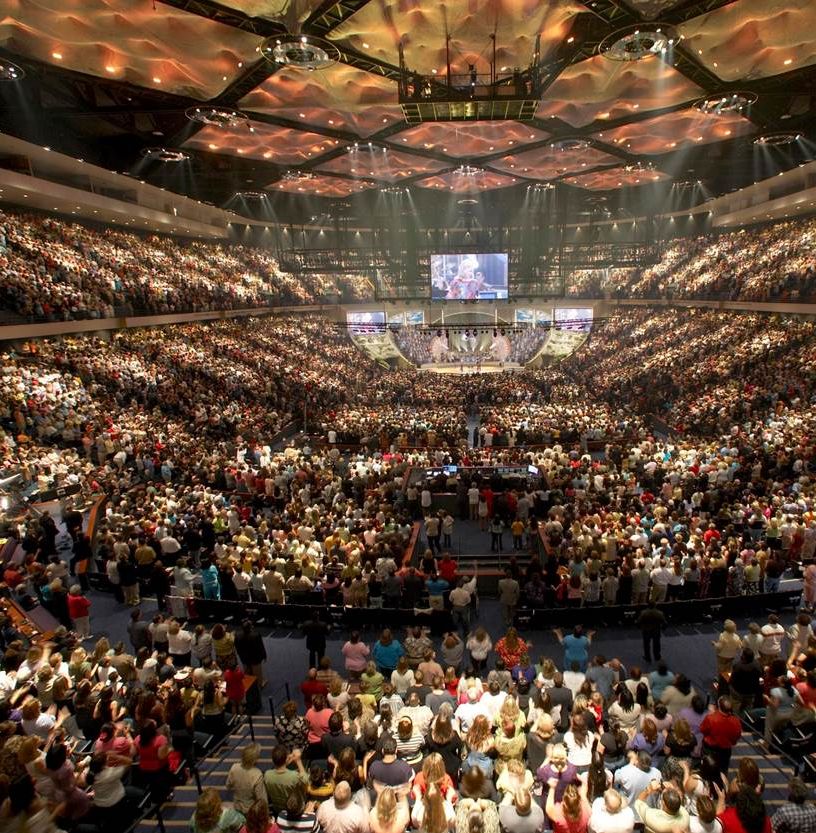The megachurch definition is a Protestant Christian that has at least 2,000 attendees each week. Here’s a question: Does a bigger church equate to a better church? The growth of mega-churches can be an exciting sign for those looking to be part of a large, diverse spiritual community. However, having bigger churches doesn’t necessarily mean those same believers are connecting with God on a deeper level. Churches must nurture strong spiritual connections between people and their faith, regardless of size.

THE RISE OF Mega churches in recent years has spawned the Church Growth Movement (or CGM). The CGM refers to the businesses/services geared toward helping pastors grow their churches. With all this emphasis on gaining larger congregations and building bigger churches, is the growth of the people in the churches being neglected?
Table of Contents
- The Impact of Mega Churches
- Video Transcript
- The Rise of Mega Churches
- What Real Church Growth Looks Like
- Frequently Asked Questions About Megachurches
- Outsmart the False Teachers
The Impact of Mega Churches
Join me as I weigh in on the impact of the Church Growth Movement.
Video Transcript
The Rise of Mega Churches
With the rise and popularity of megachurches within the last 10 to 15 years, a business sector has developed that is devoted to helping pastors and church leaders grow their churches. These companies offer business strategies/techniques that will supposedly grow a pastor’s congregation – or even turn a small church into a megachurch.
This emphasis on church growth is what I call the Church Growth Movement.
The problem with the Church Growth Movement is that it emphasizes superficial church growth over real church growth.
Nowadays, Church growth is all about larger congregations, lavish church buildings with state-of-the-art amenities, celebrity preachers, and, of course, more money, more money.
Now, there’s nothing wrong with this in and of itself. I’m not hating a church’s “bling bling” or all the bells and whistles it can offer its members.
While all those things are nice, those things are just symbols of what I consider Superficial Church Growth.
Know why?
Because the REAL church is not the building, the people in the church building are the REAL church. Yes, the people are the church.
What Real Church Growth Looks Like
If a pastor wants to grow his or her church, the best way to do that is from the inside out. In other words, PEOPLE MUST GROW.
A church that ministers to the people’s needs and provides them with the practical resources necessary for transforming their lives will grow organically.
For example, if a person on welfare joins a church and 6 to 12 months later, that member is off welfare and working a full-time job with the church’s help. That’s REAL church growth.
If a person is addicted to drugs/alcohol and after joining the church, they break that dependency and are now clean and sober with help from the church. That’s REAL church growth.
When people grow, they have a testimony. What do people do when they have a testimony?
They tell others. They spread the word about how their church/ministry helped them GROW and improve their life. People they know will see the CHANGE.
The bottom line is when people SEE the lives of the people in the church changing for the better, they will be more likely to join your church, pastor.
That’s REAL church growth.
You see, a bigger church is not always a better church. What’s the point of having a bigger church in the lives of the people in the church are not better?
So, pastor, if you REALLY want to grow your church, then focus on GROWING the people.
Frequently Asked Questions About Megachurches
What Defines Megachurches by Size?
A megachurch is typically defined by its large attendance, often having 2,000 or more people attending its weekly services. These churches often have a centralized location but may also operate in multiple sites or satellite campuses.
Beyond size, megachurches are known for their extensive range of programs, state-of-the-art facilities, and, often, a charismatic lead pastor. While size is the primary defining characteristic, these churches’ influence, reach, and resources can also set them apart from smaller congregations.
Why Do People Say Megachurches Are Evil?
Some critics argue that megachurches prioritize entertainment over genuine worship, with their high production values and charismatic leaders sometimes overshadowing the core teachings of Christianity. There are also concerns about the commercialization of faith, as some megachurches generate significant revenue and may be perceived as more business-oriented than spiritually-driven.
Additionally, several high-profile scandals involving megachurch leaders have led to skepticism about their intentions and ethics. For example, Hillsong Church, founded in Sydney, has faced controversies including the firing of lead pastor Carl Lentz for extramarital affairs. Reports of abuse, financial lack of accountability, and mistreatment of volunteers have also surfaced at various branches.
However, it’s important to note that not all megachurches are viewed negatively, and many have robust, faithful communities.
Why Do Some People Believe Megachurches Are Scams?
Some individuals believe that certain megachurches operate more like businesses than places of worship, focusing on generating revenue through tithes, offerings, and product sales. Critics also point to the lavish lifestyles of some megachurch leaders, arguing that they profit off the donations of their congregants.
A few high-profile financial and ethical scandals involving megachurches have also fueled skepticism. For example, James MacDonald, founder of Harvest Bible Chapel in Illinois, was fired in 2019 after making inappropriate comments. The church faced accusations of financial mismanagement, with MacDonald using church funds for personal expenses, as well as fostering a culture of fear and bullying.
However, it’s essential to differentiate between individual cases and generalize all megachurches, as many serve their communities faithfully and transparently.
Outsmart the False Teachers

Discover the hidden truth about tithes the prosperity preachers don’t want you to know.👉👉 Click here.








